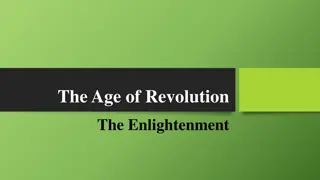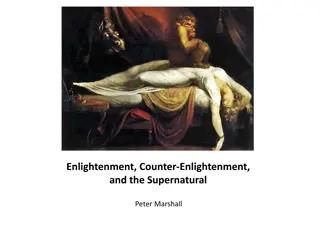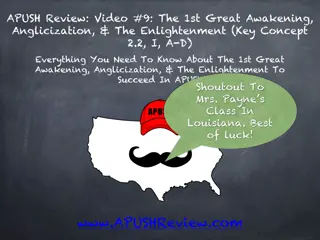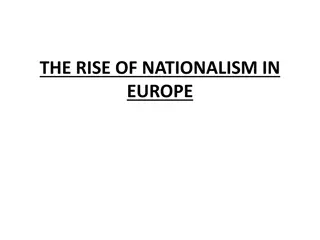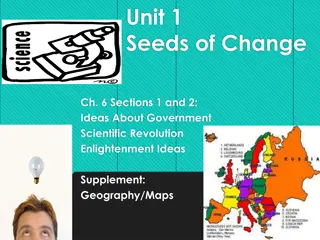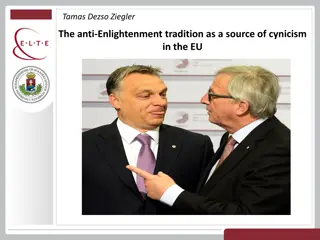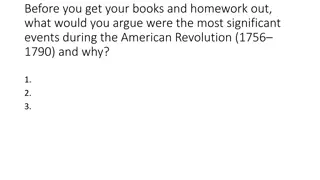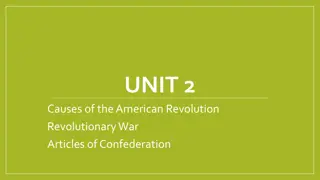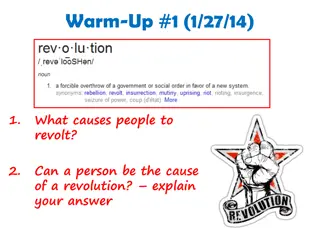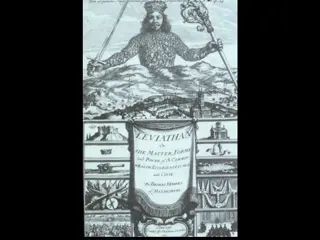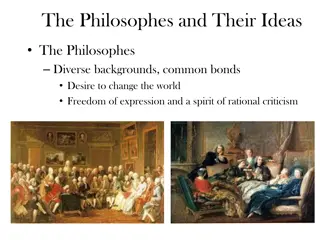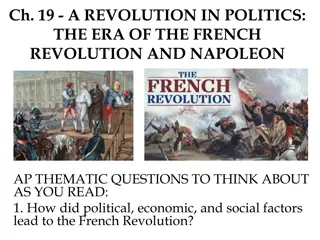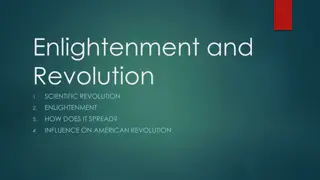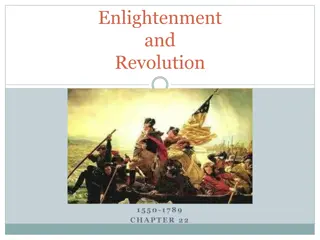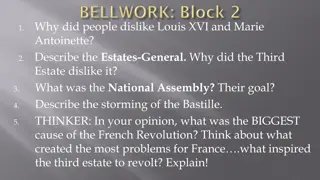Enlightenment Philosophers and Their Influence on the French Revolution
The French Revolution was influenced by Enlightenment philosophers like Thomas Hobbes, Rousseau, Voltaire, and Montesquieu. Their ideas on social contracts, collective sovereignty, enlightened absolutism, and the need for checks and balances challenged the traditional Ancien Régime's feudalism, privilege, and divine-right absolutism. These philosophical underpinnings fueled the drive for reform in state and society, leading to significant socio-economic changes and shifts in public sentiment that ultimately culminated in the revolutionary events in France.
Download Presentation

Please find below an Image/Link to download the presentation.
The content on the website is provided AS IS for your information and personal use only. It may not be sold, licensed, or shared on other websites without obtaining consent from the author. Download presentation by click this link. If you encounter any issues during the download, it is possible that the publisher has removed the file from their server.
E N D
Presentation Transcript
The French Revolution HI31J Origins
Ancien Regime Feudalism Privilege Divine-right Absolutism Religion Tax collection Venality Clientage/Patronage
Drive to Reform State and Society Socioeconomic changes Consumption Potato Fiscal military commitments Worldviews change: Enlightenment Political ideas Change in sentiments Public Opinion
Enlightenment Political Ideas The Social Contract Thomas Hobbes (1588-1679) Leviathan (1651) Fled English Civil War, to Paris Witnessed the Fronde in France (also a civil war) European Thirty Years War, deadliest until WWI Violence everywhere!! Life is nasty, brutish and short Struggle of all against all Social contract: consent to confer absolute power, sovereignty, to a single person (monarch) Secular justification for absolutism; differed from divine- right justifications Coercion in his philosophy of society is taken for granted
Rousseaus Du contrat social (1762) Replaces coercion/subjugation with morality Republicanism (obsessed with virtue and decline) Can t return to state of nature, so how shall we live together in society? Collective sovereignty and the general will How to harmonize particular wills with the general will? Prioritise the general interest over particular ones Civic morality, education, festivals, civil religion Teach people to see the general interest Alternative to the Leviathan Social bonds are moral, not coerced
Enlightened absolutism Voltaire Hated noble privilege, religious fanaticism, censorship Sought to replace divine-right absolutism with enlightened absolutism Militated for universal taxes (since nobles did not pay as many as others) Rational government (not democratic)
Montesquieu (1689-1755) The Spirit of the Laws (1749) Vatican puts on the Index (i.e., banned) Magistrate in one of the French sovereign courts (parlement), which opposed absolutism Need for checks-and-balances (parlements should check the absolute monarchy) Newtonian of society: society is guided by general laws Two kinds of laws Positive law (decreed, promulgated) General laws (the ones dictated by nature and found in the historical evidence from societies around the world) The first sociologist?
Montesquieu Ideal types of societies Monarchies honour Republics (aristocratic and democratic) virtue Despotisms fear You identify the type of society then discern its animating principle, the way that Newton discerned the law of gravity: observation
Events 16th-17thcenturies Wars of Religion (1562-1598) Concludes with Edict of Nantes (Henri IV, first Bourbon) Fronde (1648-1653) Revolt of parlement, Parisians, nobles Louis XIV boyhood Shaped his authoritarian inclinations
Machault Affair (1749) Controller General Machault d Arnouville Permanent vingti me tax (1/20th) imposed on all subjects per year after end of war (usually war taxes would be suspended after a war) Undermined noble privilege Voltaire supported Machault Parlementary magistrates objected Crisis of 1750s
Billets de confession 1749-1754 Arch-bishop of Paris, Christophe de Beaumont, requires suspected Jansenists to submit to the Bull of Unigenitus (which condemned Jansenism) or be denied the sacraments, including last rites (without which one goes to hell). Parlement pursues Beaumont in 1752, seizing his property Several laws of silence and lits de justice by king, exiling the magistrates until they agreed
Damiens Affair Attempted assassination of Louis XV in 1757 Damiens: servant for a parlementary magistrate (risked making the Parlement and Jansenists look like regicides) Spectacular execution of Damiens attitudes about punishment change. Being drawn and quartered begins to look barbarous Encyclop die goes underground
Maupeou Coup & Constitutional Crisis 1771-1774 Maupeou disbands Parlements Replaced by new non-venal courts Puts magistrates on the state payroll Resistance Parlements draw on Montesquieuian language: Checks and balances Representing the nation
Physiocrats Rise of political economy Invention of a science of the economy Attempt to de-personalise it and make it seem like the product of natural market forces Physiocrats Believed that agriculture was the basis of all productivity and wealth Tax land, not people; spur agricultural production Free markets Adam Smith took inspiration from them but differed: didn t think agriculture was the sole basis of national wealth. Importance of trade and commerce.
Economy Attempts to implement free-market economy between 1760s and 1780s Often resisted by officials and policing forces, who often sympathised with the plight of the hungry and believed in market regulations Revolts Attempts to implement free-market policies led to backpedaling into paternalistic regulation between 1760s and 1780s Erratic and reversed policies weaken the bonds between governing elite and the population agitation, criticism.
The Enlightenment and Modernity Epistemological Shifts (discussed) Campaign to reform state and society (discussed) Rational governance; liberal economic reforms; effort to replace influence of Church with Enlightenment knowledge producers; equality of taxation Climate of Opinion The Tribunal of public opinion
What is the public sphere? J rgen Habermas The Structural Transformation of the Bourgeois Public Sphere (1962)
The public sphere a space of rational-critical debate where private individuals come together to form a public where public opinion is formed and expressed, often in critical opposition to the state or ruling elite.
Where were the publics? Print culture High and low (treatises and libels/pornography) Literacy rates double over 18thcentury Newspapers Nouvelles eccl siastiques (underground Jansenist newspaper, 1728-1803 Mobilised public against monarchy s efforts to impose the Bull of Unigenitus (which condemned Jansenism) Theatres Who decides playbills? Who decides what a good script is? Street theatre politics against the monopolistic privileges of elite theatres (Com die-fran aise) Clubs (freemasons, literary societies) Drinking publics (caf s, taverns, pubs) Salons (? - perhaps not; too small. But places where cultural patronage occurred)
Public Sphere Print: a reading revolution Literacy rates rise dramatically between 1686 and 1789 Men = from 29% to 47% Women = from 14% to 27% Shift in what people read from devotional literature to works on law, science, criticism and fiction Shift from intensive, reverential reading to extensive critical reading Seditious literature libels, pornography draw on Enlightenment epistemology to ridicule church and state
Tribunal of Public Opinion Rising authority of public opinion Seen as a legitimate voice in public affairs between 1720s to 1780s Political impact of its content -- Political libels in the form of histories of the regime Authorities unwittingly contribute to its rise By policing it, public becomes aware of its own power By addressing it (through authorities covert propaganda) By invoking the concept of public opinion
The public vs. the people' Rise of popular agitation in late 18thcentury peasant revolts urban rebellions Fear of the masses intensifies Transform the people into a public How? More enlightenment!
A regime of credit Two kinds of credit 1. Cash to crown favour opportunities (opportunities = patronage, privileges, offices) 2. Anonymous forms of financial credit: bonds
Financial strains Debts accrue from wars 1748, 1763, American War of Independence Baroque tax collection system (venal collectors, tax farms) Venality reached saturation point Privileges Parlement tries to protect its tax privileges
Redistributive Crisis Crown can t satisfy redistributive demands For patronage: Courtiers For rents on public debt: Financiers For subsidies, protections: Manufacture (France is hammered by free-trade agreements) For food (anxiety over free-market of grain) No redistribution, no power Collapse
Redistributive Crisis II Crisis over the principles of who gets what? Privilege vs rational political economy Self-regulating markets State finances: from privatised business to public bureaucracy




